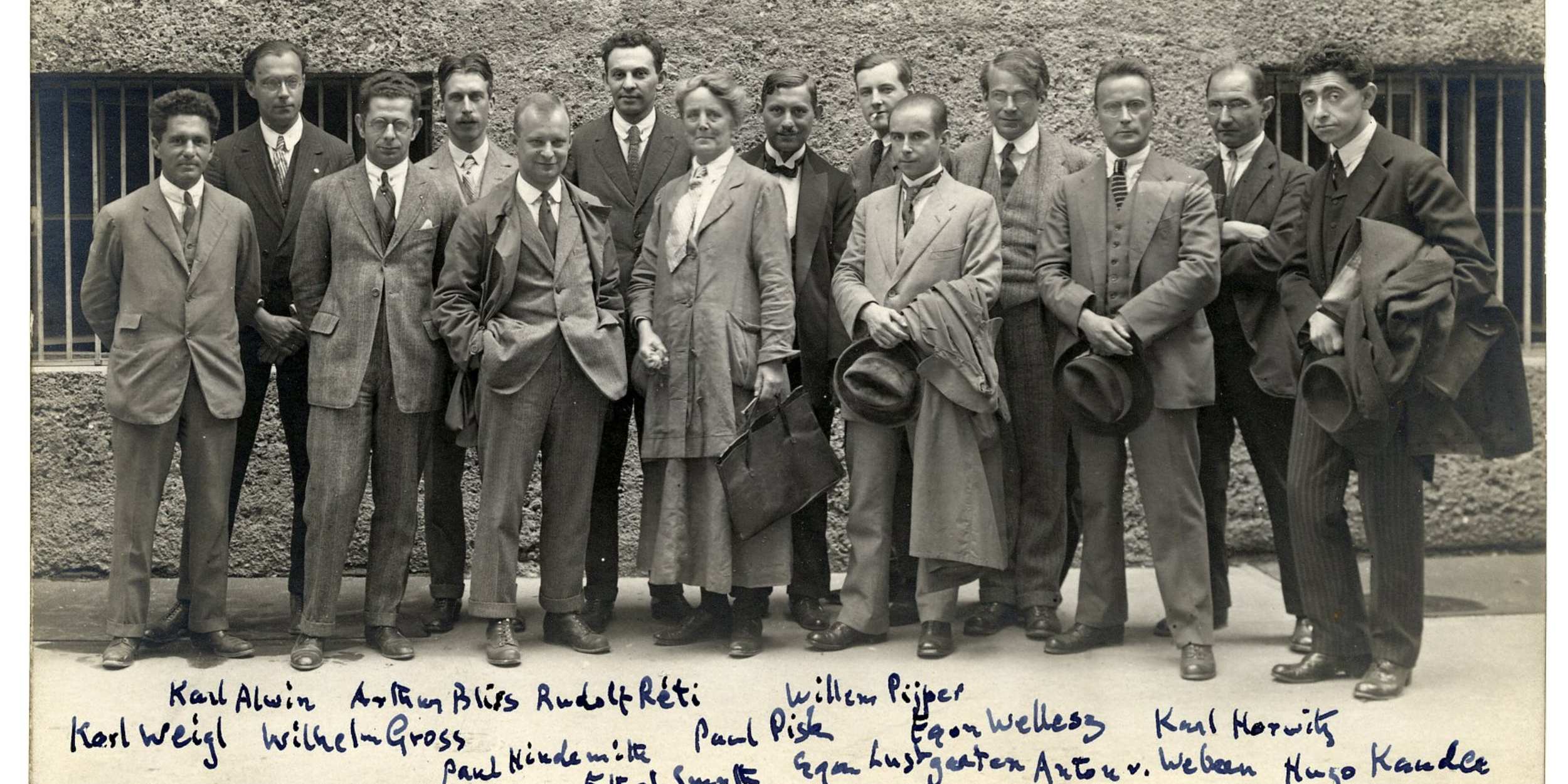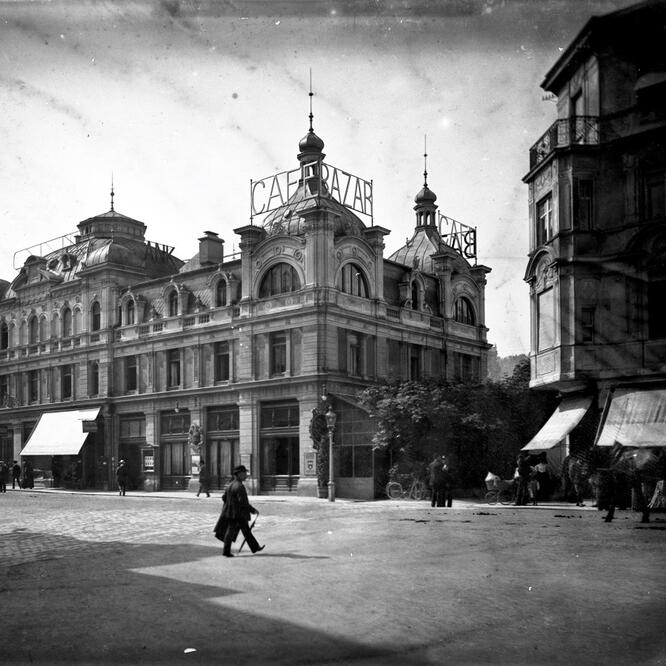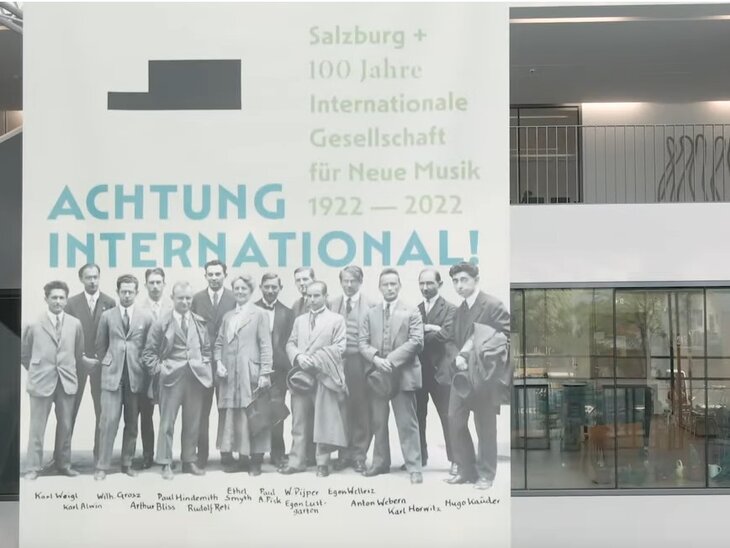Bazaar of New Music: 100 Years IGNM

© King's College Cambridge Archive, EJ Dent Papers
The Salzburg Chord: In the anniversary year "100 Years of the International Society for New Music (IGNM)," a diverse program reflects on its role as a major peace project after World War 1, on Salzburg's role as an international city in the interwar period, and on New Music's timeless claim to (re)learn how to listen.

The history of IGNM is a history of 20th century music and that of the first peace project in music.
— Matthew Werley
It was the birth of a forward-looking, people-uniting idea that began in 1922 at Café Bazar in Salzburg: the founding of the International Society for New Music (IGNM) as a representative body for composers and performers of contemporary music. Almost exactly 100 years later, musicologist Matthew Werley sits at a table in Café Bazar and looks back as well as forward to the development of the IGNM and New Music in Salzburg: "The history of the IGNM is a history of 20th century music and that of the first peace project in music. The be-all and end-all was the moral-ethical attitude that art is above politics. Societies change and adapt to the times, IGNM had and has an international mission towards the world, politics and international cooperation." Why the founding of the IGNM took place in Salzburg, of all places, was not only due to the status of the festival and the accompanying internationality of guests. As a geographically ideally situated border-crossing city with its imposing mountains to the south and its sweeping opening to the north, Salzburg has always been a perfect European focal point. "There was the 'Salzburg idea,' the idea that Salzburg was a cultural sanctuary, a place where everyone could meet on neutral ground and - through the arts - listen to each other. Salzburg offered a tabula rasa, there were no radicalizing or ideologizing currents that made it difficult to get along. It was simply a festival city and was seen by musicians as the best part of Austria. Back then, even Richard Strauss was called Austrian," Matthew Werley recounts with a laugh. Indeed, after World War 1, Mozart's city experienced a boom in tourist, economic and cultural life, especially in the field of music. "New music has an elective affinity with Mozart. It is the spectrum of aesthetics that was also evident in the people involved at the IGNM: Anton Weber, Rudolf Réti, Paul Hindemith, Hugo Kauder, Ethel Smyth, Arthur Bliss … The spectrum of music was very broad, there were all kinds of styles. Main point international." Under the title "Achtung International!" the IGNM, together with the Mozarteum University, the aspekteSALZBURG Festival and the Salzburg Festival, with the support of the City and Province of Salzburg and the Federal Ministry of Education, Science and Research, is dedicating itself to the 100-year history of a society that tied together again in Salzburg the threads of European identity and culture torn apart by two world wars, and that adopted the idea of a necessary internationality in new music. "When Max Reinhardt or Stefan Zweig came to Salzburg, everyone just wanted to leave Vienna. Hermann Bahr's thoughts about Salzburg as the capital of Europe, as the 'ghetto of cosmopolitans' were very present. With its Baroque architecture and atmosphere, Salzburg was ideal for artists of all kinds - and for a society that had suffered massively under the circumstances of war." But the "Salzburg idea" of the IGNM, as formulated by two of its founders, Rudolf Réti and Egon Wellesz, was only one of its aspects. Matthew Werley, who conceived the international symposium "Wegzeichen Neuer Musik" (Signposts of New Music) together with Thomas Hochradner as part of the annual program celebrating 100 years of the IGNM and did extensive research work - whose supervisor at Oxford, by the way, had Egon Wellesz as his doctoral advisor - speaks of the "Janus face" of the IGNM: "At the time of its founding, the society had a diplomatic purpose: to bring people together to listen to music that had been forbidden four or five years before. IGNM was a project of (new) listening. Today, too, listening, understanding each other in social as well as political matters is important. This idea already existed in antiquity, listening as an exercise for the political sphere. Then, after World War 2, the Society showed a different face: to open this highly modern music to promote young composers, to break old patterns and find something new." On the flyer for "Achtung International!" a quote from Ernest Newman, Britain's most influential music critic in the first half of the 20th century, was printed about Salzburg and new music. He heard that British music and art lovers went to Salzburg in the summer to hear their beloved Wagner or Mozart. "[…] The new spirit is much more adventurous. He goes to Salzburg, not to hear music he loves and knows, but to hear music he doesn't know, hoping that some of it wants to be worth loving. […] A great musical era has ended. A new one seems to be forming." Initial discussions about activities for the IGNM's anniversary year took place as early as the beginning of 2020. Because of the proximity and the fact that many materials were inaccessible due to the pandemic, the program in Salzburg, focuses on the representation as an international city in the interwar period and the encounters that took place here. The global scope of the research work of the Mozarteum University is impressively illustrated: numerous exhibits from 51 archives worldwide and almost 40 internationally renowned musicologists from 13 countries have been recruited for the project. The exhibition, which will open on March 16 as part of the aspekteSALZBURG, tells among other things about the first "World Music Days" of the IGNM and how New Music conquered the whole world from Salzburg. The April 20-22 conference will highlight the complex history of IGNM, its aesthetic diversity and the actors and players who shaped it, as well as the political and ethical dimensions that have always emerged in the tension between Salzburg roots and global networking. Matthew Werley will give a lecture on the significant role of Stefan Zweig for New Music, Salzburg and IGNM. "I am a historical musicologist. I am in dialogue with the old and like to trace networks and moments to make them alive once again. I still believe in the sentiment in Newman's quote: these global networks always bring something foreign, unknown - and that's normal now. There is enough material for the next 100 years of IGNM, definitely for us in musicology!" (laughs) Dates: 16. March: exhibition opening "Achtung International!" as part of aspekteSALZBURG April 20-22: international symposium "Wegzeichen Neue Musik" August 7-16: ARCO 22 & Summer Academy Mozarteum 7. August 11: Festakt im Café Bazar November 29: Nacht der Komponist*innen (First published in Uni-Nachrichten / Salzburger Nachrichten on March 4, 2022)
